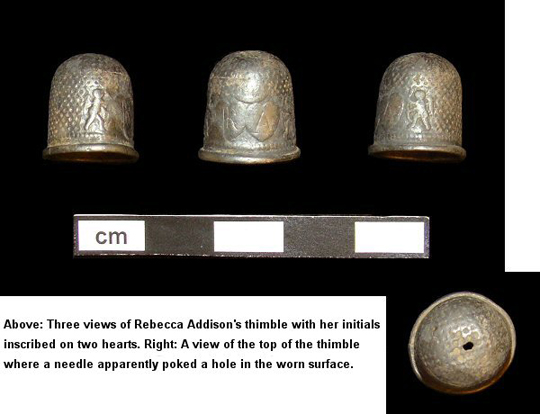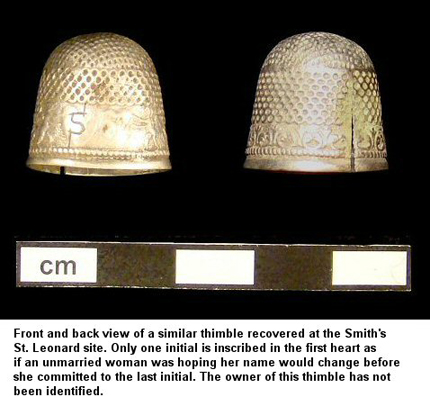Rebecca Addison's Silver Thimble
August 2008
By Sara Rivers Cofield, MAC Lab Federal Curator
We do not know when Rebecca Wilkinson was born, but we do know that she immigrated to Maryland with her father, Anglican Reverend William Wilkinson, her stepmother Mary Pudden, and two sisters in 1650.
She grew up at Westbury Manor, a 1,250-acre plantation on St. George's Hundred in St. Mary's County (Carr n.d.). As the daughter of an educated clergyman, Rebecca probably enjoyed a relatively genteel
lifestyle for an early Maryland colonist.
By 1662, Rebecca had married Thomas Dent, a merchant, attorney, and planter who held several offices in the Maryland government. They had six children together; Thomas, William, Peter, Margaret,
Barbara, and George. Dent owned over a thousand acres of land and had at least six slaves and eight indentured servants when he died in 1676, dividing his estate between his wife and children (Carr n.d.).

In 1677, Rebecca remarried John Addison, another merchant and planter who also engaged in a great deal of trade with Maryland's Indian population (Carr n.d.). It is perhaps this latter occupation that
motivated the Addisons to move up the Potomac River to what would become Prince George's County. At the time of their move around 1689, the area was on the outskirts of English settlement in Maryland,
and John Addison was tasked with keeping a magazine for the local militia in case they needed to assemble to protect from Indian attack (McCarthy, et. al. 1991).
It was perhaps on the occasion of Rebecca's marriage to Addison that she received a thimble with the initials "RA" engraved on two hearts. The love theme of the thimble was enhanced by two cupid figures flanking the hearts. The style of the small, domed thimble helps date it to the mid- to late-17th century (McConnel 1990). It was intended to look like a silver thimble, but it may be an alloy of
silver and another metal. A similar thimble was found at the Smith's St. Leonard site in Calvert County Maryland. Its date is later, probably early- or mid- 18th century, but it shows that the motif
was a popular one that persisted on personalized thimbles.
 Rebecca seems to have had plenty of time to use her cupid thimble. As mistress of a significant number of servants and slaves, she most likely did not have to concern herself with personally completing
the many laborious tasks that would be necessary to run a large plantation. Instead she had the luxury to engage in the fine needlework and sewing that was considered an appropriate occupation for an
English gentlewoman.
Rebecca seems to have had plenty of time to use her cupid thimble. As mistress of a significant number of servants and slaves, she most likely did not have to concern herself with personally completing
the many laborious tasks that would be necessary to run a large plantation. Instead she had the luxury to engage in the fine needlework and sewing that was considered an appropriate occupation for an
English gentlewoman.
It is clear that the thimble saw many, many hours of use. The diminutive needle pusher is so worn that a small cartouche over the hearts is almost indecipherable, and the top became so weak that a needle
actually poked a hole in it. The hole would not have rendered the thimble completely useless, but its indentations are so worn that Rebecca probably had difficulty catching a needle with it. Despite
its special inscription, it may have been deliberately discarded when it became too difficult to use.
Rebecca's thimble was recovered in 1988 by archaeologists who excavated the house she and John Addison built along the Potomac c. 1689. It was in a trash and brick rubble deposit near the house. Rebecca's son Thomas Addison inherited the property around 1705, but she may have continued to live with him until her death in 1726. Although we do not know exactly when she was born, Rebecca must have been at least 77 years old when she died.
| References |
|
| Carr, Lois Green |
| n.d. |
Dr. Lois Green Carr's Biographical Files of 17th and 18th Century Marylanders. http://www.msa.md.gov/msa/speccol/html/carr.html sc4040-0438-1, sc4040-0438-7, sc5094-1134-125, sc5094-0021-04. |
|
| McCarthy, John P., Jeffrey B. Snyder, and Billy R. Roulette, Jr. |
| 1991 |
Arms from Addison Plantation and the Maryland Militia on the Potomac Frontier. Historical Archaeology (25)1: 66-79. |
|
| McConnel, Bridget |
| 1990 |
A Collector's Guide to Thimbles. Secaucus, New Jersey: Wellfleet Books. |
|